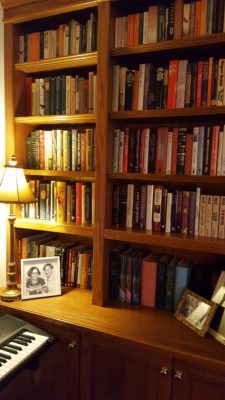The modern world is rife with short lists to accomplish big goals: five secrets to success, six ways to get rich, seven steps to getting in shape, eight ways to read more books this year.
Fake news, I say, especially the last claim. I’ve been reading voluminously all my long life since I learned the skill when I was four years old. (I had older sisters and brothers who were readers and I absorbed it by osmosis.) It seems to me you either love it or not, and it does run in families: Seeing Dad reading at every chance he got in his work-filled farmer’s life saw most of his 11 children take to reading early and avidly; seeing their mother with her nose in a book everyday of their lives saw my boys, too, become lifelong readers.
The riposte’s trigger
The trigger for this riposte was a post on LinkedIn by Neil Pasricha, Harvard Business Review, February 3, 2017, “8 Ways to Read (a Lot) More Books This Year”. Its legitimacy, I guess, stems from it being published in the Harvard Business Review, but I found his advice virtue signaling of the rankest variety: For a reader, it is irrelevant; for a non-reader, it is flagrant look-at-me preening. For instance:
- “Centralize reading in your home.” No, just read everyday wherever you are in your home, including newspapers, magazines, books, etc. Finding a perfect place to read is just finding an excuse not to read.
- “Make a public commitment.” Why? Your private commitment should suffice—unless you want to virtue signal to friends and colleagues about what a great reader you are.
- “Find a few trusted, curated lists.” While lists on Amazon, in Chapters/Indigo or from friends can sometimes be helpful, they soon become annoying as your curiosity spreads to include all sorts of subjects and your patience shortens to exclude poor writing. And I have come to shun prize-winning books because they are often just reflections of the trend du jour, offering no true nourishment for the soul.
- “Change your mindset about quitting.” When you are new at the game, yes, keep going through big words, long sentences, dense text, giving the writer the benefit of your attention until the story is told. When you are a seasoned reader, no, stop when the writer bores you; you have earned your discriminating sense of good writing and have no time to waste on tosh.
- “Take a “news fast” and channel your reading dollars.” Everyone I know who reads a lot reads newspapers and magazines amidst his/her steady stream of books. In fact, readers are curious people intrigued by all sorts of things, and the news is one of the basic things in life. But it’s just the basics, and readers also want the more substantial take given in essays and books.
- “Triple your churn rate.” To give away books is an unnatural act to a reader. Books become your friends and their physical presence brings comfort and joy into a home. I will lend you a book, but want it back in its niche on the bookshelf when you have read it. And physical books are beautiful, I think, adding a touch of class to whatever room they grace.
 “Read physical books.” Yes, yes, yes! Books are beautiful objects, and part of the pleasure of reading is the heft, the smell and the feel of the book. When I tried to read the Bible on Kobo, it frustrated me no end because I couldn’t easily move back and forth to reread a passage or check a reference. And I never knew where I was: a few pages in, halfway through or almost at the end of a book.
“Read physical books.” Yes, yes, yes! Books are beautiful objects, and part of the pleasure of reading is the heft, the smell and the feel of the book. When I tried to read the Bible on Kobo, it frustrated me no end because I couldn’t easily move back and forth to reread a passage or check a reference. And I never knew where I was: a few pages in, halfway through or almost at the end of a book.
- “Reapply the 10,000 steps rule.” I agree with Stephen King’s advice, “Read 5 hours a day,” by using the many times during a day, e.g., standing in queues and waiting for appointments, to read. But for material that demands concentration, you need to devote an hour or two to just that. Otherwise, you skim surfaces and defeat the whole purpose of reading.
Reading’s purpose is to read literature
And lest we forget, the purpose is to read literature. In The Story Species: Our Life-Literature Connection, Joseph Gold says it perfectly, “Literature is the most important aid we have in forming identity. If we ignore it, we risk living formless, disconnected lives, slave to every manipulative wind that blows, whirled about passively like a page of yesterday’s newspaper on a dangerous street in the City of Zombies.”
Prescient or what? His future has arrived as the instant protests swirl around the streets of the zombie-left cities on the coasts of the USA, leader of the free world. The antidote is reading good books, I agree, but to get there takes effort and time. So just start reading and you’ll get better and better at winnowing the wheat from the chaff.




As I found out, reading book review publications (TLS) can lead you to some interesting subjects you may otherwise overlook.
JMP